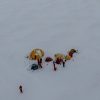The Trump administration has made an 11th-hour decision to designate Yemen’s Houthi rebels as a foreign terrorist organisation in a move that is likely to severely worsen the war-torn country’s humanitarian crisis.
The US secretary of state, Mike Pompeo, announced the decision late on Sunday, despite bipartisan opposition and months of warnings from UN officials and aid organisations that the designation – part of the White House’s “maximum pressure” campaign on Iran and its allies – would lead to shortages and delays for aid and commercial shipments and undermine the peace process.
Relief organisations greeted the news with dismay on Monday. David Miliband, the chief executive of the International Rescue Committee, called it “pure diplomatic vandalism”.
“The last thing the Yemeni people need is further interruption of aid and economic flows,” said the former British foreign secretary. “The opposite is needed – effective pressure on all parties to the conflict to cease using civilians as hostages in their war games.”
The Norwegian Refugee Council’s Yemen director, Mohamed Abdi, said the move would “hamstring the ability of aid agencies to respond” to the already dire situation.
“Yemen’s faltering economy will be dealt a further devastating blow,” he said. “Getting food and medicine into Yemen – a country 80% dependent on imports – will become even more difficult.”
Classifying Houthis as terrorists will worsen famine in Yemen, Trump is warned
Read more
The Houthis, officially known as Ansar Allah, stormed Yemen’s capital, Sana’a, in 2014, prompting President Abd Rabbu Mansour Hadi to flee. The rebels receive support from Iran, while a Saudi- and Emirati-led coalition of Arab nations fighting to restore the internationally recognised government is aided by western arms sales, maintenance and training.
The coalition has vastly superior air power and has been accused of conducting indiscriminate and disproportionate airstrikes, and both sides have been accused of targeting civilians. The Houthis have siphoned off aid, routinely imprison and torture dissenters, and harass and detain humanitarian workers.
The conflict has led to what the UN says is the world’s worst humanitarian crisis, killing more than 112,000 people and leaving most of the 30 million-strong population dependent on aid to survive.
Malnutrition and outbreaks of disease such as cholera are rife. The arrival of Covid-19 and western aid cuts in 2020 have driven what remains of Yemen’s healthcare system to the brink of collapse.
In a statement posted to social media channels on Monday, the rebel leader Mohammed al-Houthi said the group reserved the right to respond to the US decision, saying “American terrorism” was to blame for “killing and starving the children of Yemen”.
About 70% of Yemenis live in areas controlled by the Houthis, making them especially vulnerable to the new US rules.
Abdulghani al-Iryani, an analyst with the independent Sana’a Center thinktank, said the terrorism listing may have the opposite effect to that intended, instead shoring up the Houthis’ position.
“The Houthis don’t really have assets outside Yemen to freeze. Instead this measure will further weaken the Yemeni people who live under Houthi control and make it easier for Houthis to tighten their grip and recruit more children to the battlefield,” he said. “The extra cost [associated with providing aid] is also more likely than not to go to the pockets of Houthi-affiliated middlemen.”
Pompeo said in a statement that the US “recognises concerns that these designations will have an impact on the humanitarian situation in Yemen”. Measures such as issuing special licences by the US Treasury would allow US aid to continue to flow and for humanitarian organisations to continue to work there, he said.
The Houthis could theoretically be unlisted again by Joe Biden, who takes office as US president on 20 January, but observers worry that lasting damage will have been inflicted before the new administration can get around to addressing the issue.
Biden has promised voters he will end longstanding US support for Saudi Arabia’s role in Yemen’s war.























































Свежие комментарии